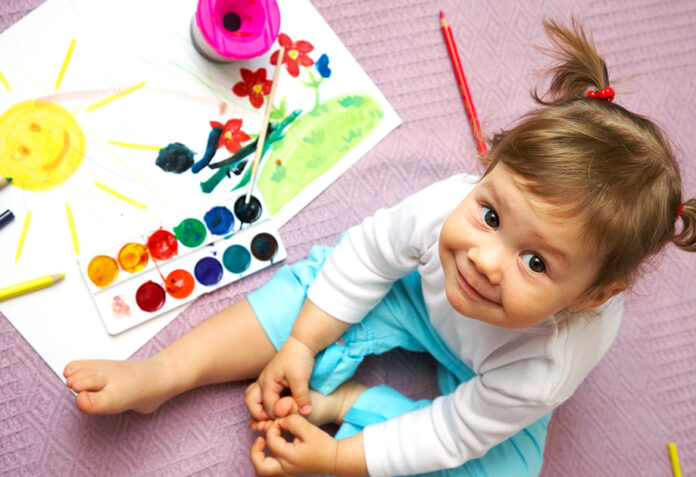Developing concentration in toddlers has become crucial in a world buzzing with constant distractions and short attention spans. Imagine your child engrossed in a task, their little eyes focused, their minds fully engaged. Concentration is the secret sauce that unlocks their potential, paving the way for a future filled with success and fulfillment. So, fasten your seatbelts and get ready to embark on a journey that will transform the way you view concentration in toddlers and, ultimately, their lives.
Developing concentration in toddlers has numerous benefits that extend well into adulthood. Here are some key reasons why it is important to foster concentration at an early age:
Why is it essential to develop concentration in toddlers at an early age?
- Building a solid foundation for learning
Concentration is the cornerstone of effective learning. By enhancing toddlers’ ability to concentrate, we equip them with the skills to absorb information, understand concepts, and perform academically. When children can focus on a task without being distracted, they can engage in deep learning experiences that foster knowledge retention and critical thinking.
- Improving cognitive abilities
Concentration plays a vital role in cognitive development. When toddlers concentrate, their brains are actively processing information and making connections. By honing their concentration skills, we stimulate neural pathways, enhance memory retention, and promote cognitive growth. Improved concentration also boosts problem-solving abilities, decision-making skills, and creativity.
- Enhancing social and emotional development
Concentration skills contribute to healthy social and emotional development in toddlers. When children can concentrate on conversations, social cues, and non-verbal communication, they develop stronger interpersonal skills and empathy. Moreover, concentration allows children to regulate their emotions, remain focused in social settings, and build meaningful relationships with peers and adults.
- Cultivating self-discipline and resilience
The ability to concentrate requires self-discipline and resilience. When toddlers learn to overcome distractions and maintain focus, they develop valuable life skills. Concentration helps them resist the temptation of instant gratification, persevere through challenges, and stay committed to their goals. These qualities are essential for success in various areas of life, including academics, sports, and personal relationships.
10 Different Ways to Increase Concentration in Toddlers
Now that we understand the significance of developing a concentration in toddlers from an early age, let’s explore ten different ways to enhance their focus and attention:
- Create structures for play, learning, and rest for Toddlers throughout the day
A structured environment provides a foundation for concentration. Establish a daily routine with designated distractions and clutter, allowing your toddler to focus on the task. That will help focus on one thing at a time and act as a building block for better concentration.
- Engage in interactive activities
Interactive activities stimulate concentration in toddlers. Encourage playtime with puzzles, building blocks, and educational toys. These activities require focused attention, problem-solving, and hand-eye coordination, promoting the development of concentration skills.
- Limit screen time
Excessive screen time can hinder concentration in toddlers. Set reasonable limits on using electronic devices and encourage alternative activities like indoor or outdoor sports that engage their minds and bodies. Screen-free playtime allows children to explore their imagination, be creative, and develop sustained focus.
- Encourage mindfulness and meditation
Mindfulness and meditation techniques are beneficial for improving toddler concentration. Teach your child simple breathing exercises and guide them through short meditation sessions. These practices promote relaxation, mental clarity, and the ability to concentrate on the present moment.
- Break tasks into manageable segments
Long tasks can overwhelm toddlers, leading to a lack of concentration. Break tasks into smaller, more manageable segments. Celebrate achievements after completing each segment, motivating your child to stay focused throughout the task.
- Establish clear expectations and rewards
Clear expectations and rewards incentivize concentration. Communicate the desired behavior and explain the benefits of sustained focus. Offer small rewards or praise when your child demonstrates concentration skills, reinforcing their motivation to concentrate in the future.
- Provide a quiet and comfortable study area
A quiet and comfortable study area enhances concentration. Set up a designated space where your toddler can engage in focused activities, such as reading, drawing, or solving puzzles. Ensure the area is well-lit, organized, and free from distractions.
- Engage in physical activities
Physical activities contribute to improved toddler concentration. Encourage regular exercise and outdoor play, as they promote healthy brain function and release excess energy. Physical exertion enhances blood flow to the brain, positively impacting cognitive abilities.
- Practice active listening and storytelling
Active listening and storytelling activities engage a toddler’s concentration. Read aloud to your child and ask questions about the story to encourage active listening. Engage in storytelling sessions where your child needs to follow the narrative and recall details, fostering concentration skills.
- Be a role model for concentration
Children often mimic the behaviour of their parents and caregivers. Be a positive role model by demonstrating concentration in your activities. When your child sees you engaged in tasks with focus and determination, they are more likely to develop similar habits.
How to Develop Concentration in All Aspects of Life
Concentration is not limited to specific activities or tasks; it is a skill that can be developed and applied to all aspects of life. Here are some practical tips for cultivating concentration beyond early childhood:
- Practice mindfulness and meditation
Mindfulness and meditation are effective techniques for developing a concentration in all aspects of life. Set aside dedicated time each day to engage in mindfulness practices. Focus on your breath, observe your thoughts without judgment, and cultivate present-moment awareness.
- Prioritize tasks and minimize distractions
Prioritization and minimizing distractions are essential for maintaining concentration. Create a to-do list and identify the most critical tasks. Minimize distractions by turning off notifications on electronic devices, closing unnecessary tabs on your computer, and creating a quiet work environment.
- Break tasks into manageable chunks
Breaking tasks into manageable chunks helps maintain focus and prevent overwhelm. Divide complex projects into smaller, actionable steps. Complete one step at a time while concentrating on the immediate task, gradually progressing toward the overall goal.
- Practice deep work and time blocking
Deep work involves dedicating uninterrupted blocks of time to focused, high-quality work. Implement time-blocking techniques by scheduling specific time slots for deep work. During these periods, eliminate distractions and fully immerse yourself in the task.
- Engage in regular exercise and healthy habits
Physical exercise and healthy habits contribute to improved concentration. Regular physical activity enhances blood flow to the brain and boosts cognitive function. Get sufficient sleep, eat a balanced diet, and stay hydrated, as these factors directly impact your ability to concentrate.
- Embrace single-tasking and monotasking
Multitasking can negatively affect concentration and productivity. Embrace single-tasking and monotasking by focusing on one task at a time. Give your full attention to each activity, completing it before moving on to the next. This approach allows for deeper engagement and more effective concentration.
Developing concentration in toddlers is a crucial endeavor that sets the stage for their future success. By understanding the importance of concentration at an early age, exploring practical ways to enhance it, and applying concentration techniques to all aspects of life, we can empower our children and ourselves to thrive in a world that demands focus and attention. Start implementing these strategies today and witness the positive impact on concentration and overall well-being.




